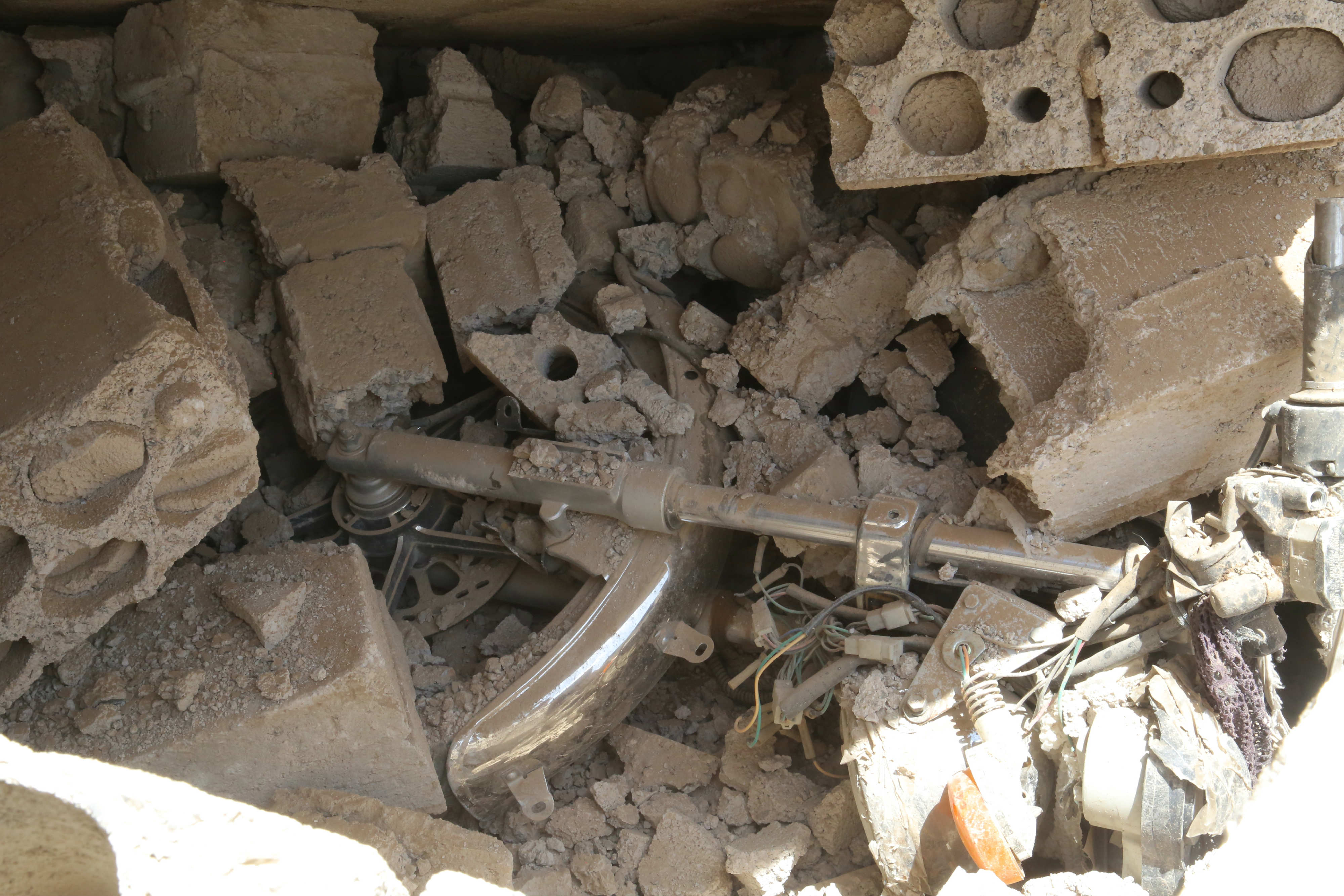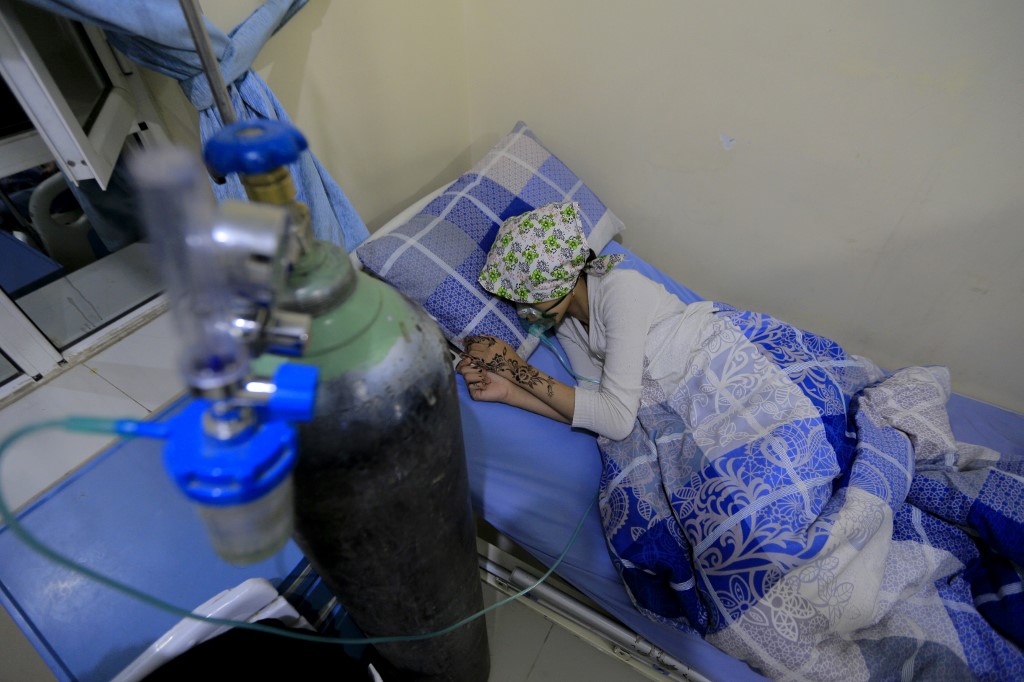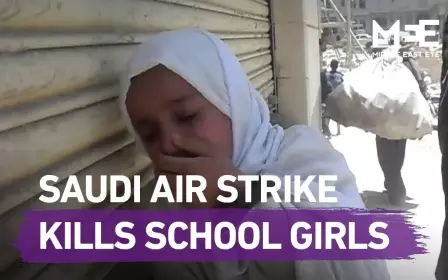Between life and death: Yemen air strike survivors relive bombings

"When I heard the first bomb, I embraced my son to calm him, but the next bomb destroyed our house while we were inside it," said Um Osamah.
Um Osamah is a mother of four children living in Sanaa's Saawan district.
Three of her children had gone to school on the day of the attack earlier this month, but the youngest, three-year-old Osamah, does not yet attend school and was at home.
It was at around 11am when Um Osamah heard explosions near her house and she immediately ran and embraced her son, who had begun crying when he heard the blasts.
"I did not expect another bombing to target us, but I wanted to calm my child, and after only few minutes I heard very noisy buzzing and I did not feel comfortable with what was going on," she told Middle East Eye.
"I was embracing my child in the bedroom, and I did not hear the explosion, but when I recovered consciousness, I heard the sounds of neighbours looking for me.
"My child was under me and he was safe, and I was only injured in my back, hand, leg and with some small bruises, a piece of wood from the roof was over my back and it had protected us."
Others in Saawan were not so lucky. Eleven civilians, including five school girls at the neighbourhood's Al-Ra'ai School, were killed in the alleged Saudi-led coalition air strikes, according to UN officials.
Military camp
The Saudi-led coalition did not claim immediate responsibility for the bombing, but the Saudi-owned Al-Arabiya TV channel said on the day of the attack on 7 April that Saudi-led air strikes had targeted a military camp near to a residential area.
The only air strikes in Saawan on that day were those which hit near the school and surrounding houses.
Um Osamah's experience is just one of hundreds that Yemenis have endured since the Saudi-led coalition intervened in the country's civil war in 2015 to restore the Yemeni government.
Tens of thousands of people have been killed or injured since then, among them at least 17,700 civilians, according to the UN.
The coalition has been repeatedly criticised by rights groups for its bombing campaign, despite its repeated claims that it does not target civilians.
'Praying to Allah'
Once Um Osamah regained consciousness she started to speak to her child, and when she realised he was safe she started shouting to people to let them know where they were.
"I could not walk even one metre from my place as the pieces of wood from the roof were over me, so I was very worried that people would dig over the wood and a wall might fall on us," she said.
"That was my only concern, so I kept shouting all the time to let people know where I was."
Um Osamah does not know how long she and her son remained under the ruins, poised between life and death.
"I was shouting and praying to Allah to save me and my child, and finally I came out from under the ruins," she said.
"When I got out, I could not believe that we were safe as the house was completely destroyed, as well as three other houses.
"My children, husband, relatives and neighbours were waiting to meet me, and they were very happy to see me safe."
Along with the 11 dead, dozens of other civilians were injured in the bombings, with many residents losing everything they had.
Um Osamah told people to look for her jewellery and other valuable items under the ruins. She managed to get most of them but most of the furniture was broken.
"Life was the most important thing for me. Now we live in my uncle's house but I feel happy as I am still alive and all my family members are good," she told MEE.
'Death is better'
Zabeebah Fuad lost her husband, Mohammed, in the same bombing in Saawan on 7 April and has been left devastated by the death of her partner.
"The bombing happened while I was cooking at my house and my husband was in the sitting room. I do not remember the details very well because I fainted after the bombing and recovered consciousness after they found me under ruins," she told MEE.
"I was happy that I was still alive, but after I knew that my husband was killed, I hated life as I have five children without a breadwinner."
Fuad and her children live in her brother's house, who is now the breadwinner of the family but is currently without a job.
"My children are looking for their father and I cannot forget him at all, moreover my brother cannot provide us with all our needs," she said.
"Life has become very difficult, and death is better than this life."
Zabeebah is very pessimistic about the future and feels that her children will suffer in their future life.
"I hope that my children can overcome all obstacles and achieve their dreams," she said.
Happiness of finding someone alive
Residents do not hesitate to help victims of the bombings when they happen in their area.
When Ali Al-Faeq, 29, heard the bombing in Saawan, he immediately ran to help the victims.
"Many rescuers have been killed in the bombings while they were trying to look for people under ruins as air strikes usually target the same place in more than one air strike," he told MEE.
"While I was looking for people under the ruins, a wall fell on me and I was about to die but, praise be to Allah, I am well now and have only small injury to my body."
Faeq, who has helped dig for people in several bombings, considers rescuing people to be a duty of all neighbours in order to save lives.
He said: "No one can imagine the happiness of the rescuer when he finds a person alive under ruins and also the survivors feel happy to find themselves safe."
Faeq called on all Yemenis not to flee the area after a bombing but to run to help people under the rubble.
Psychological trauma
Muneer Qaed, an expert at the Ministry of Education, disagrees with Faeq's rallying call and advises civilians to flee from any targeted areas as air strikes usually involve double-tap strikes in the same place.
"We have heard about many people who were targeted by air strikes while they were rescuing civilians under rubble, and walls falling on other rescuers, so it is not at all safe for civilians to rescue people after bombings," Qaed told MEE.
He said that the Civil Defence is responsible for rescuing people and they run to the targeted area as soon as they hear the bombing.
"Usually the Civil Defence and authorities converge on the targeted area to prevent civilians from arriving there, but some civilians insist on rescuing people," he said.
Regarding the psychological effects of the attacks, Qaed said that neither the victims or the rescuers can forget the moments of the bombing, and they often have to visit psychologists.
"If a person was under the ruins and he was rescued, definitely that will create psychological trauma, especially if he lost a relative," said Qaed.
Meanwhile, Um Osamah hopes that the war will end and people can once again live safely in their country.
"Safety is our main demand nowadays, and I do not feel safe at all. Rather, I am expecting a new bombing any moment."
Middle East Eye delivers independent and unrivalled coverage and analysis of the Middle East, North Africa and beyond. To learn more about republishing this content and the associated fees, please fill out this form. More about MEE can be found here.








